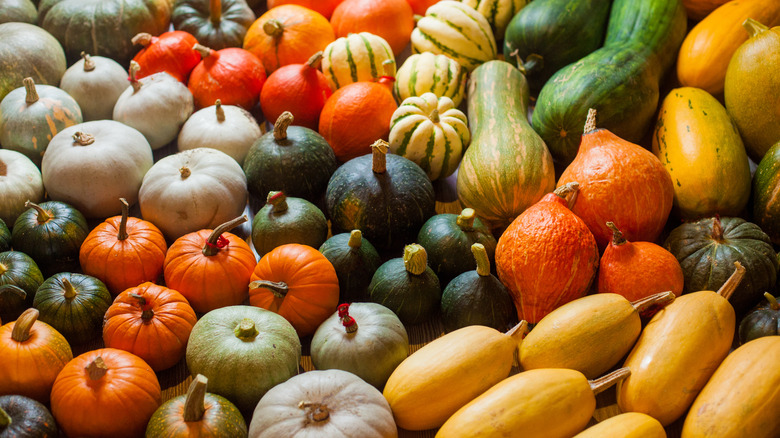Why You Should Be Eating Squash During The Winter
When summer begins to give way to fall and the temperatures drop, it seems many people begin to look for squash recipes to suit the season. No matter the variety of winter squash you prefer, there's one very good reason for picking up a few of them each time you go grocery shopping. According to Bustle, people start to crave easy lunch recipes of winter squashes like butternut, acorn, spaghetti and pumpkin squashes because they help bolster the immune system. Each of these squashes have their own nutritional benefits, but all of them have a high concentration of carotenoids, which are what help support the immune system, especially during flu season.
These types of squash among other winter squashes are also rich in key vitamins such as A, C, and B6, which are also helpful to the immune system. According to Eating Well, butternut squash has more than 400% of your daily vitamin A needs per cup of the bright orange squash. It also has 40% of your daily vitamin C and both alpha and beta carotene all of which are great for boosting your immune system (via WebMD).
This is what each of those squashes can offer your immune system
According to Eating Well, acorn squash is rich in vitamins A and C, as well as magnesium and potassium. But another reason to love acorn squash is that you can easily halve and cook the entire squash then eat it whole. While it is not vital to eat the skin of the squash to get the maximum benefit, you can pack more fiber into your diet by doing so. Pumpkin is also an excellent source of vitamin A, with more than 200% of your daily needs per cup of the squash (via Healthline).
That's partially because it is such a good source of beta-carotene. Pumpkin is rich in vitamins C and E, which are good for the immune system. Thanks to its high water content — 94% — pumpkin is quite hydrating and a low-calorie food like many other winter squashes. Eating Well explains that spaghetti squash is not the most nutritious of all winter squash varieties in terms of packing in vitamins. However, the popular squash is still worth adding to the mix from time to time. It does have plenty of carotenoid antioxidants and adds fiber to your diet too.

